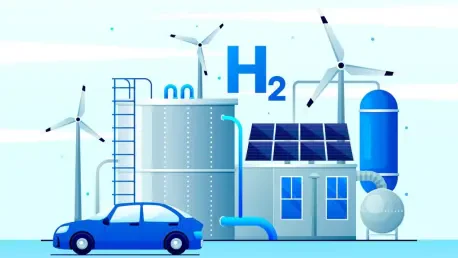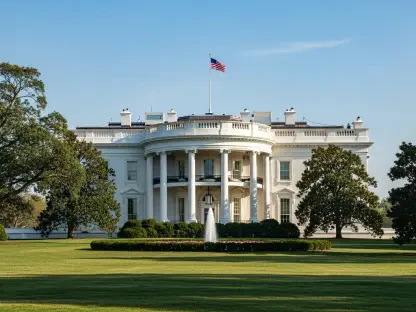Imagine a state once synonymous with the roar of automotive assembly lines now leading a silent revolution in clean energy, powering a sustainable future for the world, and redefining industrial practices with cutting-edge technologies. Michigan, long celebrated as the heart of American manufacturing, stands at the forefront of a global energy transition, harnessing innovations in battery safety, hydrogen fuel, and energy-efficient materials to set new benchmarks. This transformation is not just a local phenomenon but a catalyst for international change. This report explores how Michigan’s industrial legacy and strategic vision are driving a green tech surge, reshaping economies and environmental outcomes on a global scale.
Michigan’s Rise as a Clean Energy Powerhouse
Michigan’s journey from a traditional manufacturing hub to a leader in clean energy innovation reflects a profound shift in industrial identity. Historically known for pioneering the automotive industry with the assembly line, the state is now channeling that expertise into sustainable solutions. This pivot builds on a robust foundation of engineering talent and infrastructure, positioning Michigan as a natural epicenter for green technology advancements.
Key sectors driving this change include battery technology, hydrogen fuel development, energy-efficient materials, and sustainable industrial practices. These areas are not only addressing pressing environmental challenges but also redefining market demands. Companies like UL Solutions, LuxWall, Inc., and Robert Bosch, LLC are at the helm, each contributing specialized innovations that enhance the state’s reputation as a clean energy leader.
The presence of major players underscores Michigan’s strategic importance. UL Solutions focuses on battery safety, LuxWall pioneers energy-saving building materials, and Bosch advances hydrogen technologies, collectively creating a diverse ecosystem of progress. Supported by the state’s historical industrial strength, these efforts leverage existing skills and networks, ensuring that Michigan remains a vital contributor to global sustainability initiatives.
Key Innovations Driving the Energy Transition
Cutting-Edge Technologies and Trends
Michigan’s clean energy landscape is marked by groundbreaking technologies that address critical needs in multiple industries. UL Solutions’ North America Advanced Battery Laboratory in Auburn Hills exemplifies this, conducting rigorous safety tests for electric vehicle (EV) batteries through thermal and mechanical assessments. Similarly, LuxWall’s vacuum-insulating glass technology reduces energy consumption in buildings, while Bosch’s research into hydrogen fuel cells offers promising alternatives for commercial mobility.
Emerging trends further amplify Michigan’s influence, with electric vehicles, energy-efficient construction, and alternative fuels gaining traction. Consumer and industrial demand for sustainable solutions fuels these developments, pushing companies to innovate rapidly. The EV market, in particular, benefits from proximity to Detroit’s automotive giants, creating a synergy that accelerates the adoption of green technologies.
Strategic initiatives by the state also open significant opportunities for growth. By fostering an environment conducive to research and development, Michigan attracts investment in green tech sectors. This proactive approach ensures that innovations not only meet current needs but also anticipate future challenges, cementing the state’s role in the global energy transition.
Economic Impact and Growth Metrics
The economic ripple effects of Michigan’s clean energy innovations are substantial, with job creation serving as a key indicator of success. LuxWall’s facility in Litchfield, for instance, currently employs 87 workers and plans to reach 450 jobs as part of a broader expansion. This growth mirrors similar contributions from other companies, invigorating local communities with new opportunities.
Financial backing plays a crucial role, with investments like UL Solutions’ $104 million commitment to battery testing facilities and LuxWall’s access to over $31 million in federal funding. State grants, such as those from the Michigan Strategic Fund, further bolster these efforts, ensuring that projects have the resources needed to scale. Such support highlights a commitment to economic revitalization through sustainable practices.
Looking ahead, projections suggest Michigan could attract even more green tech businesses, driven by a favorable business climate and ongoing investments. This growth trajectory aligns with global sustainability goals, positioning the state as a model for balancing economic progress with environmental responsibility. The potential for continued expansion remains strong, promising a lasting impact on both local and international levels.
Challenges in Scaling Clean Energy Innovations
Scaling Michigan’s clean energy innovations presents a complex set of challenges that must be navigated carefully. Technological hurdles, such as the scalability of hydrogen fuel systems and the intricacies of establishing universal battery safety standards, pose significant obstacles. These issues require sustained research and development to ensure reliability and widespread adoption.
Market dynamics add another layer of difficulty, with competition from other states and regions intensifying the race for green tech investments. Michigan must differentiate itself through unique offerings and strategic positioning to maintain its edge. This competitive pressure underscores the importance of agility in responding to global demands and investment trends.
Potential solutions lie in increased funding, public-private partnerships, and regional collaboration. Initiatives like the Midwest Alliance for Clean Hydrogen (Mach##) exemplify how cooperative efforts can address scalability issues by pooling resources and expertise. Additionally, ongoing investment is essential to overcome adoption barriers, ensuring that Michigan’s innovations reach their full potential on a global stage.
Policy and Support Shaping Michigan’s Green Tech Landscape
A robust policy framework underpins Michigan’s emergence as a clean energy leader, with state and federal support playing pivotal roles. Grants from the Michigan Strategic Fund and the Michigan Business Development Program provide critical financial assistance to companies like LuxWall and Bosch. These incentives enable large-scale projects that might otherwise face funding constraints.
Federal backing further accelerates innovation, as seen with the $31 million allocated to LuxWall for its energy-efficient glass production. Such support not only drives technological advancements but also fosters a business-friendly environment. Policies are crafted to encourage investment while maintaining a focus on sustainability as a core objective.
Compliance and safety standards are equally important, particularly in high-stakes areas like battery testing and hydrogen production. Rigorous regulations ensure that innovations meet global benchmarks, enhancing credibility and market acceptance. This balance of support and oversight shapes industry practices, reinforcing Michigan’s reputation as a trusted hub for clean energy development.
The Future of Clean Energy in Michigan and Beyond
Looking toward the horizon, Michigan’s innovations hold immense potential to influence global energy markets in profound ways. Technologies developed within the state, particularly in hydrogen fuel and battery systems, could redefine how industries approach sustainability. This long-term vision positions Michigan as a key player in shaping international energy strategies.
Emerging disruptors, such as advancements in hydrogen as a mainstream fuel source, signal exciting possibilities. Combined with evolving consumer preferences for sustainable products, these shifts are likely to drive market dynamics in unexpected directions. Michigan’s ability to adapt to these changes will be crucial for maintaining leadership in the sector.
Global economic conditions and policy shifts will also impact future growth, alongside regional collaborations like Mach##. These factors create both opportunities and uncertainties, requiring a nimble approach to innovation and investment. Michigan’s proactive stance suggests a readiness to navigate these complexities, ensuring its contributions remain relevant on a worldwide scale.
Michigan’s Role in a Sustainable Tomorrow
Reflecting on Michigan’s journey, it is evident that the state’s transformative contributions to clean energy have redefined industrial landscapes through corporate innovation and strategic partnerships. The dual benefits of environmental sustainability and economic revitalization have breathed new life into communities, showcasing a model for others to emulate.
Moving forward, actionable steps include prioritizing continued investment in research and infrastructure to sustain momentum. Strengthening policy support through incentives and streamlined regulations has proven vital in attracting global players. Fostering deeper collaborations, both regionally and internationally, offers a pathway to tackle scalability challenges head-on.
Finally, a focus on workforce development emerges as a critical consideration, ensuring that local talent is equipped to drive the next wave of green tech advancements. Michigan’s story has laid a foundation, but the next chapter depends on bold actions to cement its legacy as a beacon of sustainable progress in a rapidly changing world.









